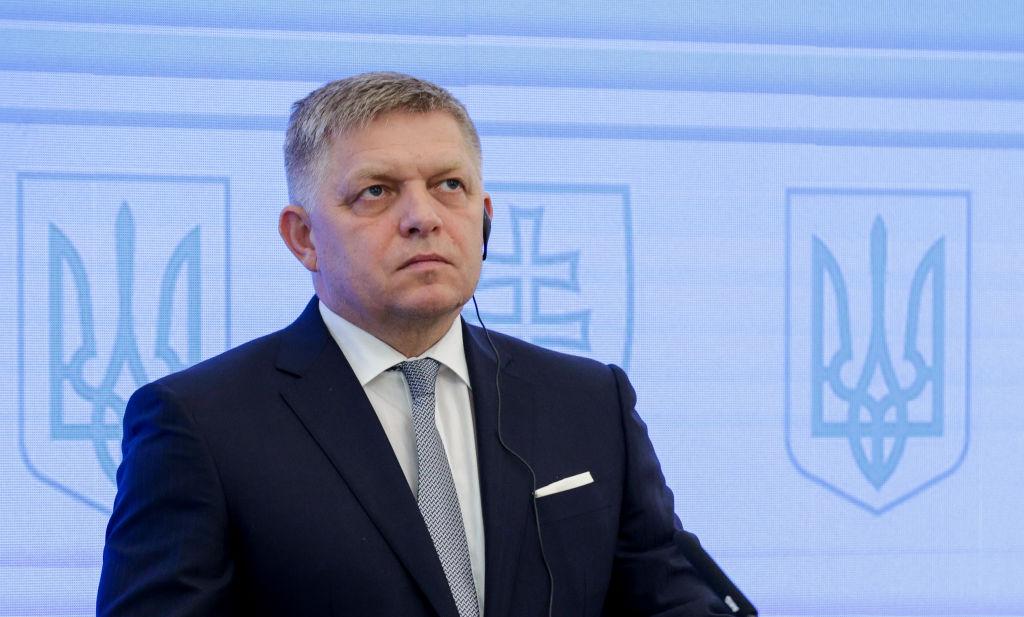Slovakia’s anti-democratic government is doubling down
Posted By Sona Muzikarova on June 19, 2024 @ 08:57

Just as Slovakia entered a moratorium on public speeches and campaigning ahead of this month’s European Parliament elections, Prime Minister Robert Fico delivered his first public remarks since he was seriously injured in an assassination attempt in May.
On May 15, Fico was shot four times at close range in the former mining town of Handlova in central Slovakia after chairing an offsite cabinet meeting. He was transported to the hospital in critical condition, underwent several rounds of surgery and is now recuperating at his home in Bratislava.
In a recorded video address, Fico said he ‘forgives’ the man who tried to kill him. But he swiftly blamed the ‘politically unsuccessful and frustrated’ opposition for the circumstances that led to the shooting, calling the assailant the opposition’s ‘messenger of evil and political hatred’. Fico added that he had ‘no reason to believe this was an attack by a lone madman.’
The shooter, 71-year-old poet and former security guard Juraj Cintula, reportedly opposed Fico’s media policies and his government’s stance on Ukraine. But as an anti-minority, anti-immigrant activist with ties to an ultra-nationalist group that has acted as a pro-Russia propaganda tool, Cintula could hardly be described as a supporter of the progressive liberal opposition, let alone its messenger.
Nevertheless, the attempted assassination is indicative of Slovakia’s toxic political climate and deepening polarisation (among the highest in Europe [1]), which reflects three main factors. First, an intense intergenerational conflict is playing out across Slovakia’s political spectrum as older, rural and often disillusioned voters find themselves at odds with the opposition’s younger, urban and more pro-Western voter base.
These groups increasingly struggle to find common ground, causing rifts within households and local communities. For example, while the current government’s supporters are preoccupied with pensions, social benefits, and ‘preserving peace’—having been convinced by Fico that aiding Ukraine would drag Slovakia into a military conflict with Russia—younger voters view the country’s NATO and European Union memberships as crucial security guarantees. Meanwhile, social conservatives, seeing ‘progressive’ or ‘liberal’ politics as a threat to traditional family and religious values, assume a defensive stance that stifles constructive political dialogue.
Second, Slovakian voters have been inundated with incendiary rhetoric, misinformation and hate speech, all amplified by social media. Fico himself has repeatedly, and falsely, accused former president Zuzana Caputova of being a ‘foreign agent’ serving ‘American interests’, possibly contributing to death threats against her and her loved ones. His cabinet members similarly mischaracterised pro-Western presidential candidate Ivan Korcok as a warmonger to stoke fears among supporters of the ruling party, Smer-Social Democracy.
Lastly, Fico’s return to power has exacerbated the problem. Fico, Slovakia’s longest-serving prime minister, staged an unlikely political comeback in 2023, five years after he was forced to step down to quell a political crisis sparked by the murder of a journalist investigating allegations of high-level corruption. Over the past few years, several members of Fico’s former cabinet have been suspected of, and in some cases charged with, serious criminal offenses.
Consequently, the government dismantled the Special Prosecutor’s Office, which was responsible for investigating such crimes, and tried to overhaul the penal code immediately after assuming office, triggering widespread protests. The government has also sought to restructure public media to tighten control over news content, thereby undermining press freedom and the European Union’s rule-of-law standards.
The outcome of April’s presidential election could further undermine democratic checks and balances, as the government-aligned president, Peter Pellegrini, is unlikely to challenge the executive branch, as Caputova did. Notably, the president is responsible for appointing constitutional court judges and has the authority to pardon convicted criminals. With Pellegrini’s victory, the administration’s control of the legislative and executive branches may extend to the presidency.
Any hope that Fico’s shooting would serve as a wake-up call and unite Slovaks in support of their fledgling democracy has been dashed. Shortly after the assassination attempt, several senior government officials suggested that the media played a role in radicalising the prime minister’s shooter, telling journalists to look in the mirror. Fico’s address has made it abundantly clear that the government intends to use this tragedy to suppress the opposition and independent media, enabling it to pass controversial laws with little pushback.
Fico’s shooting could also fuel political violence across Europe and beyond, as populists around the world push for peace in Ukraine at the expense of Ukraine’s territorial integrity. In the days following the assassination attempt, Michal Simecka, the leader of Slovakia’s main pro-democracy opposition party, and Polish Prime Minister Donald Tusk both received death threats.
But while Fico appears emboldened, the government might be overestimating how long it can maintain its current policy course, given Slovakia’s heavy reliance on its trading partners, allies and international investors. The looming threat of losing crucial EU funds could constrain the government’s illiberal reforms, especially as Slovakia faces increased pressure from soaring energy prices and the EU’s reformed Stability and Growth Pact, with its rigid debt-reduction targets.
Moreover, Slovakia’s shift from legacy car manufacturing to electric vehicles will demand fresh inflows of foreign capital. But the ongoing political turbulence has diminished the economy’s international appeal and undermined its fiscal prospects, driving young Slovaks to seek opportunities abroad.
Even if Fico’s shooting bolsters his political support, the opposition and the media must continue to scrutinize and challenge the ruling coalition. Amid a recent spate of government bills aimed at eroding Slovakia’s remaining democratic safeguards, sustained international pressure is more important than ever.
Article printed from The Strategist: https://aspistrategist.ru
URL to article: /slovakias-anti-democratic-government-is-doubling-down/
URLs in this post:
[1] highest in Europe: https://v-dem.net/data_analysis/MapGraph/
Click here to print.